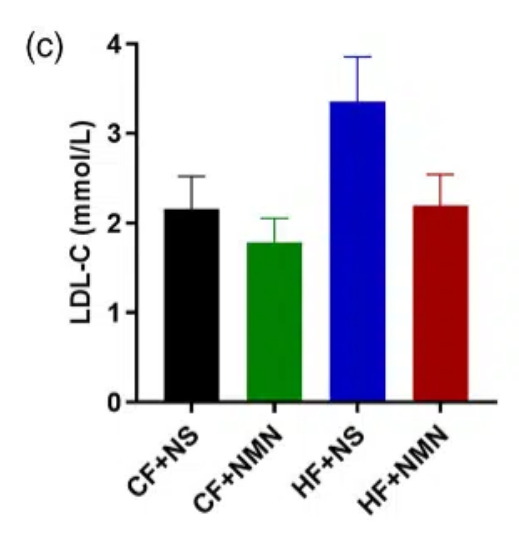A recent study in mice investigated the use of NMN supplements as a treatment strategy for obesity and metabolic disorders, since numerous studies have shown that NAD+ levels are reduced in obese mice.
Key Points:
NMN showed numerous benefits for mice on a high-fat diet:
- NMN slowed weight gain & lowered inflammation from adipose tissue
- NMN improved glucose tolerance, while reducing blood lipid levels
- NMN reduced the amount of fat stored in the body
16-Week Study Compares Metabolic Health of Mice Fed A High-Fat Diet Versus Regular Diet
The mice were divided into two groups. One was fed a regular/chow-fed diet and one was fed a high-fat diet for 8 weeks.
“Body weight was monitored weekly, and food intake was recorded daily.”
NMN supplementation of 500 mg/kg was given every day to half of both groups for 8 weeks. Normal saline was administered to the rest as a control.


NMN Slowed Weight Gain
The mice that were fed the high-fat diet had a significant increase in body weight, but the rate at which they were gaining weight was slower in the NMN group.
So, although NMN supplementation didn’t directly lower their overall body weight, it did significantly lower the weight of adipose tissue.
“NMN reduced fat mass, which visibly translated into a significantly lower weight of the WAT and BAT in NMN treatment mice.”
WAT & BAT are referring to white adipose tissue & brown adipose tissue.
NMN Improved Glucose Tolerance & Reduced Blood Lipid Levels
NMN significantly reduced Total Cholesterol and LDL Cholesterol induced by the high-fat diet.

Blue: this represents the mice on a high-fat diet without NMN. Their LDL Cholesterol is greatly elevated.
Red: this represents the mice on a high-fat diet that were treated with NMN. Their LDL Cholesterol is much lower.
Green: this represents the chow-fed regular diet group taking NMN. They too experienced a decrease in LDL Cholesterol, though not as significant.
Black: this represents the group eating a chow-fed regular diet without being treated with NMN. Notice that their LDL Cholesterol is on par with that of the high-fat NMN treated group.
“NMN improved glucose tolerance and reversed blood lipid levels in mice induced by an HFD.”
Glucose tolerance is important because it plays a role in absorbing and processing glucose from food. If impaired, it can lead to elevated levels of glucose in the blood, which can increase the risk of developing diabetes and other health problems.
NMN Reduced Amount of Fat Stored
The NMN supplementation reduced the amount of fat stored throughout the body, decreasing the expression of genes that are responsible for forming fat-storing tissues.
NMN was specifically shown to reduce the amount of fat in the liver.
NMN Lowered Inflammation from Adipose Tissue
“Obesity is often associated with the infiltration of macrophages in adipose tissue, which leads to chronic inflammation 19“
NMN supplementation drastically improved the adipose tissue inflammation associated with the high-fat diet.
Conclusion
NMN was shown to change the body composition in obese mice, reducing inflammation and decreasing the weight of their adipose fat tissue. The group also experienced an improvement in blood glucose levels, a reversal of blood lipid levels and a reduction in the amount of fat stored in the liver.
“NMN improved obesity by altering the body composition without changing weight. This study provides strong evidence for the treatment of obesity and its metabolic disorders.”
